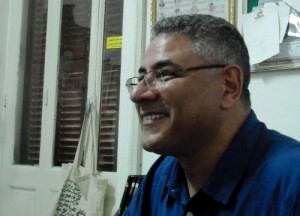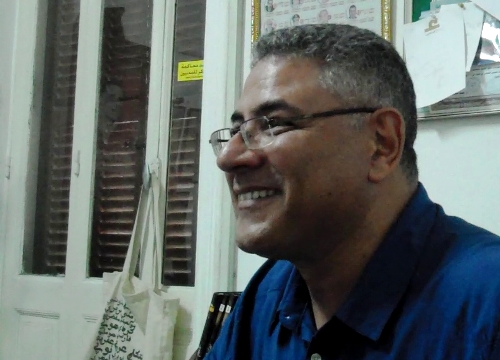 The undersigned organizations condemn the recent arbitrary travel bans issued against several individuals involved in public life, in particular human rights defenders, the latest being rights activist Gamal Eid, the director of the Arabic Network for Human Rights Information. The orders are effectively turning Egypt into a mass jail cell for these individuals. The undersigned organizations call for the immediate lifting of the travel ban from Gamal Eid and others who have been denied the right to movement and travel without any clear legal basis.
The undersigned organizations condemn the recent arbitrary travel bans issued against several individuals involved in public life, in particular human rights defenders, the latest being rights activist Gamal Eid, the director of the Arabic Network for Human Rights Information. The orders are effectively turning Egypt into a mass jail cell for these individuals. The undersigned organizations call for the immediate lifting of the travel ban from Gamal Eid and others who have been denied the right to movement and travel without any clear legal basis.
As Gamal Eid was passing through passport control before flying to Athens on February 4, the Cairo International Airport authorities informed him that his name had been placed on the travel ban list. The security authorities at the airport told him that the ban was placed pursuant to an order from the public prosecutor, without stating cause. Eid had not received notice of the ban or been called in for questioning by the public prosecutor.
Gamal Eid is a lawyer and a prominent human rights defender. He is the director and founder of the Arabic Network for Human Rights Information (ANHRI), established in March 2004 to protect freedom of expression in Egypt and the Arab region. ANHRI was awarded the Ronald Berger Human Dignity Award in 2011 for its work promoting freedom of expression and the press in Egypt. In February 2011, Gamal Eid was awarded the Leaders for Democracy award by the Project of Middle East Democracy (POMED).
A few days before the incident, in January 2016, security authorities at the Cairo airport also stopped Omar Hazek from traveling. Hazek was on his way to The Hague to receive the Oxfam Novib/PEN Award for Freedom of Expression. The airport authorities simply cited “security grounds” to prohibit Hazek from travel. They confiscated his passport and personal phone and questioned him about his activities in Egypt, the purpose of his travel, and his relationship with several international non-governmental organizations. Hazek was serving a two-year prison sentence for breaking the protest law when he was released in last September under the presidential pardon.
The repeated travel bans issued just days apart are yet another link in the series of harassments targeting activists for more than a year now. The airport authorities have previously cited security concerns to prohibit others from traveling as well: Mohammed Lotfi, human rights defender and director of the Egyptian Commission on Rights and Freedoms in June 2015; human rights defender Israa Abd al-Fattah in January 2015; and Hossam al-Din Ali, the head of the Egyptian Democracy Institute, and the vice-chair of the organization Ahmed Ghoneim in December 2014. Similar orders have also been issued against leaders and members of political parties, including Amr Hamzawy, Mostafa al-Naggar, and political activist Asmaa Mahfouz, all of whom were banned from leaving the country without cause and without being summoned for questioning.
The undersigned organizations note that such orders, issued without stating cause and pursuant to security directives, lack any legal basis. Under Article 62 of the constitution, persons banned from travel must be informed of the ban, its duration, and its cause as soon as it is issued. Such bans also constitute a curtailment of individual liberties that contravenes Article 54 of the constitution, which protects individual freedoms against arbitrary actions by state authorities, including the judiciary, and requires the affected person to be informed immediately of the grounds for the ban. This was not the case in any of the aforementioned incidents.
Travel bans are not the only violation faced by political and rights activists who seek to travel. Some have been questioned for hours inside the airport before being allowed to travel, while others have had their bags and electronic devices searched without grounds or a judicial warrant. Others have been questioned about their trips and activities abroad when they return from abroad.
These decrees and harassments follow from a fierce crackdown by state authorities aimed at shutting down the public sphere and paralyzing civil society and those involved in it. Measures began on November 10, 2014 when the Ministry of Social Solidarity began requiring all entities working in civil society activities to register under a flawed NGO law. The state has also repeatedly threatened to reopen the foreign funding case from 2011 in retaliation against civil society groups; the case involves serious charges including high treason and the receipt of foreign funding with the purpose of implementing foreign agendas to instigate chaos. In the run-up to the anniversary of the January 25 revolution, dozens of homes around Downtown Cairo were raided and searched to ensure that activists “don’t have breathing space.” Several young people were arrested on charges of inciting demonstrations and a number of cultural institutions were shut down.
Signatory organizations
- Cairo Institute for Human Rights Studies
- ADALAH Center for Rights & Freedoms “ACRF”
- Alhaqanya Foundation of Rights and freedoms
- Andalus Institute for Tolerance and Anti-Violence Studies
- Appropriate Communications Techniques for Development (ACT)
- Arab Network for Human Rights Information
- Arab Penal Reform Organization
- Association for Freedom of Thought and Expression
- Center for Egyptian Women’s Legal Assistance
- Egyptian Commission for rights and freedoms
- El-Nadeem Centre for the rehabilitation of victims of violence and torture
- Foundation Of The Victims Of Abduction And Forced Disappearance
- Habi Center for Environmental Rights
- Hesham Mobarak Law Center
- Masryoon Against Religious Discrimination
- National group for human rights and law
- The Egyptian Association for Community Participation Enhancement
- The Egyptian Center for Economic and Social Rights
- The Egyptian Center for Public Policy Studies
- The Egyptian Initiative for Personal Rights
- Nazra for Feminist Studies
Share this Post

